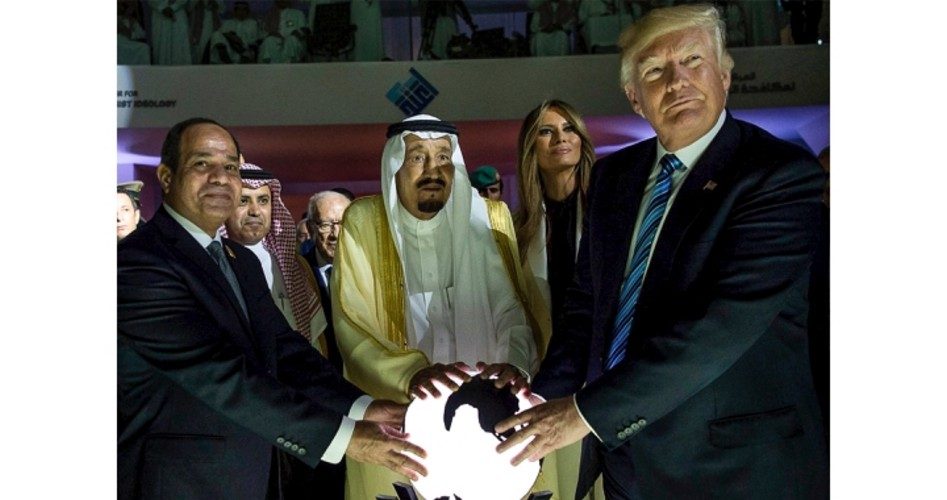
“Arab NATO”? President Trump links arms with Arab sponsors of Sunni-aligned terrorists, with the supposed aim of combatting Iran and its Shia-aligned terrorists.
During the 2016 presidential election campaign, Candidate Donald Trump stirred up a hornet’s nest of protest amongst the internationalist set with his criticism of NATO and his comments that other NATO nations “aren’t paying their fair share.” Trump’s critics and supporters speculated that, if elected, he might favor withdrawing the U.S. from the NATO alliance. Now, it appears, he favors creating another NATO, a new US-Mideast alliance that is being referred to as an “Arab NATO.”
President Trump’s first official trip abroad — to Saudi Arabia, Jerusalem, the Vatican, and Brussels, Belgium — began with a strategic meeting on Sunday, May 21, in Riyadh, the capital of Saudi Arabia. Besides netting the Saudi kingdom a handsome $110 billion military aid package, the Riyadh visit, hosted by Saudi King Salman bin Abdulaziz, featured an odd ceremony that created an instant Internet buzz. In dedicating the new Global Centre for Combating Extremist Ideology, President Trump joined King Salman and Egyptian President Abdel Fatah al-Sisi in a high-tech Command & Control Center of the new institution, where the three leaders placed their hands on a glowing orb in the image of the Earth.
Twitter, Facebook, and other social media lit up with images of the event accompanied by comments (some joking, others serious) comparing the ceremony to scenes from Lord of the Rings, Star Trek, The Avengers, and Captain America, in which archvillains covet crystal orbs or cubes that possess mysterious powers. However, while the significance of the imagery surrounding the Riyadh gathering may be speculative, the political realities flowing from it are profoundly troubling. The new Trump diplomatic venture signals a formal alignment with the “Arab Street” in the ongoing political-sectarian conflict between Arabs and Iranians, Sunni Muslims and Shia Muslims. He specifically called out the government of Iran by name 11 times in his address to the Arab Islamic American Summit in Riyadh.
https://www.youtube.com/watch?v=Pr3C7Jx4km0
“Terrorism has spread across the world. But the path to peace begins right here, on this ancient soil, in this sacred land,” President Trump said. “America is prepared to stand with you — in pursuit of shared interests and common security.”
“But the nations of the Middle East cannot wait for American power to crush this enemy for them,” he told the Summit attendees. “The nations of the Middle East will have to decide what kind of future they want for themselves, for their countries, and for their children.”
“Drive Them Out”
President Trump then demanded that leaders of Muslim nations take a harder line against Islamic jihadists, declaring:
A better future is only possible if your nations drive out the terrorists and extremists. Drive. Them. Out.
DRIVE THEM OUT of your places of worship. DRIVE THEM OUT of your communities.
DRIVE THEM OUT of your holy land, and DRIVE THEM OUT OF THIS EARTH. [Emphasis in the orginal.]
Turning specifically to Iran, then, he said: “But no discussion of stamping out this threat would be complete without mentioning the government that gives terrorists all three — safe harbor, financial backing, and the social standing needed for recruitment. It is a regime that is responsible for so much instability in the region. I am speaking of course of Iran.”
President Trump continued:
From Lebanon to Iraq to Yemen, Iran funds, arms, and trains terrorists, militias, and other extremist groups that spread destruction and chaos across the region. For decades, Iran has fueled the fires of sectarian conflict and terror.
It is a government that speaks openly of mass murder, vowing the destruction of Israel, death to America, and ruin for many leaders and nations in this room.
Among Iran’s most tragic and destabilizing interventions have been in Syria…. Responsible nations must work together to end the humanitarian crisis in Syria, eradicate ISIS, and restore stability to the region.
“Until the Iranian regime is willing to be a partner for peace, all nations of conscience must work together to isolate Iran, deny it funding for terrorism, and pray for the day when the Iranian people have the just and righteous government they deserve,” Trump insisted.
After a warm reception by Arab leaders, President Trump journeyed on to Jerusalem, for meetings with Israeli Prime Minister Benjamin Netanyahu and President Reuven Rivlin. “What’s happened with Iran has brought many of the parts of the Middle East toward Israel,” Trump told President Rivlin.
Netanyahu responded in kind, telling Trump, “I want you to know how much we appreciate the change in American policy on Iran which you enunciated so clearly.”
CFR-NeoCon Stamp of Approval?
President Trump’s pro-Arab/anti-Iran theme appears to have won approval from globalists who have been some of his harshest critics. Elliott Abrams, the senior fellow for Middle Eastern studies at the Council on Foreign Relations (CFR), led off a round of praise with a National Review piece on May 21 titled, “Trump’s Statesmanlike Speech in Riyadh.” Abrams, a militant neoconservative, has been a leading voice in the War-with-Iran choir for years. A vocal “Never-Trump” Republican, Abrams was, nevertheless, promoted by globalist forces in the GOP for a top slot in Trump’s State Department. According to various reports, though, Trump viewed Abrams’ attacks on him as going beyond the pale and turned thumbs down on any role for him at State.
While faulting President Trump’s Riyadh speech on several points — including being “too discursive” — Abrams was overall favorably impressed. “Trump was tough as nails on Iran,” the CFR oracle noted with approval, “which will gratify his Saudi hosts and the many Americans who found the Obama approach unconscionable. Obama saw Iran as a potential partner in the Middle East and subordinated every American interest to getting his nuclear deal done. Trump made it clear that he has entirely jettisoned this approach.”
“This visit to Riyadh,” said Abrams, “has cemented old friendships and showed the Sunni Muslim world that we are on their side against Iran and its dreams of Shia hegemony.”
Additional voices in the CFR chorus jumped in to bolster the refrain. General John M. “Jack” Keane (CFR), former vice chief of staff of the U.S. Army, told Fox News viewers that Trump is “revitalizing” America’s relationship with Saudi Arabia and other friendly Arab countries, which those nations see as a change from being “abandoned” by President Obama.
“The Sunni Arabs feel largely abandoned by the Obama administration,” Keane said, noting that Obama instead worked with Shiite-majority Iran. According to Keane, Trump’s deal-making in Riyadh constitutes a “framework of an Arab NATO … ready to counter the Iranians” and radical Islamic terrorism.
With Friends Like This …
But before Trump enthusiasts get too enraptured by this new Middle East pivot, it would be well to remind one and all that the condemnations the president heaped on Iran apply also to the rulers of Saudi Arabia and the chiefs of other Islamic nations who attended the summit. As The New American has reported on multiple occasions over the past several years, Saudi Arabia and its Arab allies have been providing key support for Islamic extremism — and even for al-Qaeda and ISIL/ISIS — for many years, as acknowledged by a U.S. Defense Department report, as well as by such Establishment figures as Vice President Joe Biden, Joint Chiefs of Staff Chairman General Martin Dempsey, and Secretary of State Hillary Clinton.
In an August 17, 2014 e-mail to John Podesta, a longtime Clinton-Soros apparatchik, Clinton outlined her plan on how to defeat ISIS, while avoiding “the old school solution, which calls for traditional military operations.” In the course of her comments, Clinton made this revealing statement:
While this military/para-military operation is moving forward, we need to use our diplomatic and more traditional intelligence assets to bring pressure on the governments of Qatar and Saudi Arabia, which are providing clandestine financial and logistic support to ISIL [ISIS] and other radical Sunni groups in the region.
The private e-mail admission to her cohort in crime is especially important because she had never breathed a word of this publicly.
Saudi support for Islamic extremism and terrorism is extensive, documented, and well known. The argument that they can be a good and reliable ally against terrorism is about as sensible as claiming that Mexico’s ultra-violent Sinaloa Drug Cartel can be a valuable “partner” against narcotic trafficking, since they oppose the ultra-violent Juarez Drug Cartel. Of course these cartels are in opposition to one another; they’re criminal enterprises competing for the same territory. The same goes for the Sunni Arab vs. Shia Iranian conflict: Our enemy’s enemy is not necessarily our friend.
Many conservatives have applauded President Trump’s Riyadh speech, comparing it favorably to President Obama’s infamous “apology” speech in Cairo in 2009. One of the better essays of this sort was provided in a May 21 piece on Breitbart.com (here) by Raheem Kassam, a former Muslim (but now an atheist) who is editor in chief of Breitbart London. Mr. Kassam made some valid points, including this: “President Trump used the word ‘terror’ in some way — terror, terrorism, terrorists — a whopping 31 times in his speech in Riyadh. In Cairo, President Obama used the word an even more whopping ZERO times. Obama described 9/11 as an ‘enormous trauma’ rather than a terrorist atrocity, opting to deploy the word ‘extremism’ 11 times in his speech, which President Trump also used nine times.”
However, as much as Trump’s rhetorical robustness may be appreciated in contrast to Obama’s craven PC pusillanimity, the new tilt toward Riyadh is a dangerous and disastrous move that Justin Raimondo capably skewers here at AntiWar.com.
Photo of President Trump with Egyptian President Abdel Fattah al-Sisi and Saudi King Salman bin Abdelaziz in Riyadh: AP Images
Related articles:
New ISIS Military Chief Trained by Obama Administration
Trump Highlights Huge Role of Obama and Hillary in Rise of ISIS
Obama Deepening Syria War as Prelude to More War, Based on Lies
U.S. Intel: Obama Coalition Supported Islamic State in Syria
U.S. Defense Intel Chief Obama Gave “Willful” Aid to Al-Qaeda

